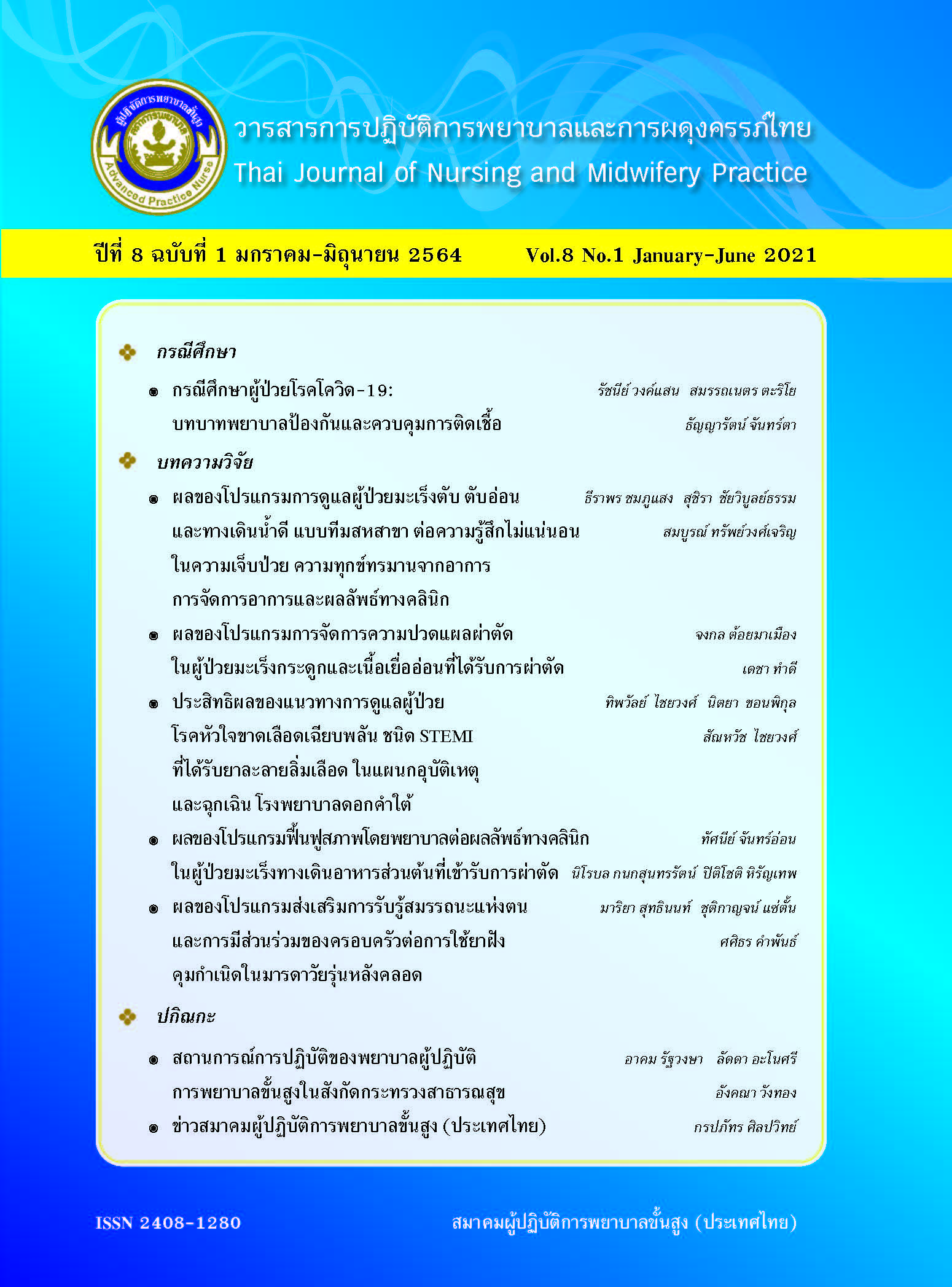The Effects of Perceived Self-Efficacy Promotion Program and Family Participation on Contraceptive Implant Use among Adolescent Mothers
Main Article Content
Abstract
This quasi-experimental research aimed to study the effects of the perceived self-efficacy promotion and family participation program on contraceptive implant use among adolescent mothers. The samples were 60 postpartum adolescent mothers who gave birth and stayed in postpartum unit at Trang Hospital. There were 30 participants in the experimental group and in the control group. Research instrument were: the perceived self-efficacy promotion and family participation program, demographic data sheet, perceived self-efficacy towards contraceptive implant use questionnaire, and contraceptive implant use questionnaires. All research instruments were validated by three experts with the content validity of 0.95. The reliability using Cronbach’s alpha coefficient was 0.95. Data were analyzed by descriptive statistics, t-test, and Chi-square test. Results showed that the mean scores of perceived self-efficacy of adolescent mothers in the experimental group ( = 85.17, SD = 5.74) was higher than in the control group (
= 60, SD = 10.06) with statistically significant (t = 11.90, df = 58, p .000). In the experimental group, the mean scores of perceived self-efficacy of adolescent mothers after the experiment (
= 85.17, S.D. = 5.74) was higher than before the experiment (
= 50.77, S.D. = 10.07) with statistically significant (t = 18.32, df = 29, p .000). The implant use among postpartum adolescent mothers of the experimental group was higher than in the control group with statistically significant (
= 8.86, df = 1, p .003). The program helped postpartum adolescent mothers in using appropriate contraceptive implant to prevent teenage pregnancy.
Downloads
Article Details
References
2. Bureau of Reproductive Health, Department of Health, Ministry of Public Health. Draft prevention and correction strategies. National Adolescent Pregnancy Problems 2017-2026 under Prevention and Correction Act, Teen pregnancy problems [Internet]. 2016 [Accessed 12 February 2018]. Available from: http://rh.anamai.moph.go.th/.
3. Thongmee N, Rathinthorn A, Limruangrong P. Factors predicting contraception in first-time adolescent mothers during postpartum period. Journal of Nursing Science 2015;33(1):51-59. (In Thai)
4. Sunanta S, Yusamran C, Phahuwatanakorn W. Effect of Providing Knowledge and Support Primiparous Adolescent Mother and Grandmother on Maternal Role Attainment. Journal of the Royal Thai Army Nurses 2016; 17(2):125-134. (In Thai)
5. Meekaew S. Factors associated with repeated pregnancy in postpartum adolescent mothers under 20 years of age Ratchaburi Province. Hua Hin Sook Jai Klai Kangwon Journal 2018;3 (2):38-48.(In Thai)
6. Chuchot R. The birth control campaign in adolescents: The roles of smart nurse 4.0. Journal of the Royal Thai Army Nurse 2018;19:42-52.
7. Bandura A. Social foundations of thought and action. A social cognitive theory. New Jersey: Prentice-Hall; 1986.
8. Lertsakornsiri M. Family support for breastfeeding in teenage postpartum mothers. Journal of Community Development Research (Humanities and Social Sciences) 2018;11(4):1-9.
9. Chaiyapan N, Sasikarn Kala S, Chunuan S. Effect of the attitude enhancement program with the spouse’s involvement on birth spacing intention among muslim teenage postpartum mothers. Songklanagarind Journal of Nursing 2017;37(1):84-96. (In Thai)
10. Cohen, JM, Uphoff NT. Rural Development Participation: Concepts and measures for project design, implementation and evaluation, rural development committee Monograph Series (Ithaca, NY:Center for International Studies, Cornell University;1977.
11. Cohen, J. Statistical power analysis for behavioral sciences. New York: Academic Press. Stat Corp. 2003. STATA Reference Manual Release 10. Texas: Stat Press;1977.
12. Jumklang S, Srisuriyawet R, Homsin P. Correlated factors with decision making of birth control implant used based on the information-motivation behavioral skills model (IMB Model) among teen mothers. The Journal of Faculty of Nursing Burapha University 2017; 25(2): 31-42. (In Thai)
13. Konchaiw N, Nirattharadorn M, Buaboon N, Sanguanklin N. Effects of a self-efficacy promotion program and husband participation on the repeated pregnancy prevention behaviors among adolescent mothers. Journal of the Royal Thai Army Nurses 2018; 19: 326-35. (In Thai)
14. Polgaya O, Choolert P. The effect of the maternal roles promoting program by family support on attitude and maternal roles among adolescent mothers. Journal of Health Research and Innovation 2019;2 (1):131-142. (In Thai)


